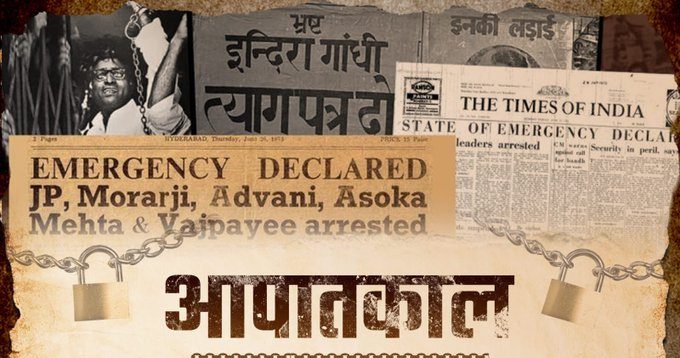Fifty years ago, on this day, the Constitution of India was put in abeyance. The political leadership, trusted to usher a new social and economic future for the citizens, conflicted with the judiciary, and the Emergency was announced.
Fundamental rights were taken away overnight. Political opposition was put behind bars. Young voices were chased away into oblivion, and the frightened citizens of India were left to reminisce about the ugly days of British rule, for such were the dictatorial and draconian measures of the government.
The Emergency was a setback for a young republic, rediscovering its civilisational place in a rapidly transforming world.
Even when the Indian citizens languished for basic necessities, they always had their fundamental rights; the right to express their opinions, the right to question their governments, the right to demand better facilities, the right to practice their religion, the right to access information via press, and the right to be critical of the government. With one proclamation, all those rights were discarded, leaving millions of citizens in a limbo.
For the people, the period was plagued with uncertainty. Many leaders, who were indefinitely jailed, were refused trial. Some have confessed that they were not even allowed to meet their family members. Defence Minister Rajnath Singh once narrated how he could not meet his mother in her final days, because he was jailed. The press, unable to function on principle, printed blank pages as a mark of protest.
The Emergency of 1975 is the story of India’s democratic character being strangled. Within this larger story, there were millions of stories, unheard, unacknowledged, and unfortunately forgotten.
Even when people had nothing, they had their rights, and they snatched away at the whims and fancies of one party. In a world oscillating between communism and democracy of the west, India, under the political leadership of 1975, was forced to choose a path that would usher an irreversible stain on our history.
A democracy flourishes because of people’s trust in the institutions. From the election commission to the judiciary, these are the pieces in the larger puzzle that come together for the country to function perfectly. The Emergency diluted the criticality of these institutions. Elections were delayed. The judgement of the Allahabad High Court was set aside. When mass sterilisations were carried out in the name of population control, people did not have an institution to turn to.
Many defenders of the Emergency proclaim that the Emergency was announced to curb possible anarchy, but in hindsight, it ushered in an era of silent anarchy within the country.
Fifty years later, the fourth largest economy of the world must not forget the lessons from the Emergency. When a political entity loses control and conviction, it turns to the institutions, even while in opposition. Some leaders blame the election commission when the results do not go in their favour. Some pin the blame on the judiciary, and if all else fails, the media is made the scapegoat. Such political entities must be discarded.
Our democracy’s strength is derived from its institutions, for these empower our citizens as well. Today, a citizen, even if in disagreement with the government, can walk upto the Supreme Court if their fundamental rights are violated. Today, a citizen, irrespective of their place in the socio-economic pyramid, can voice their criticism against the government. Despite the election results, the political opposition continues to flourish in our country. This is what democracy is all about- a voice for all.
The Emergency serves as a lesson in political governance as well. Leadership must not be used to trample upon people’s rights, but to uplift those who need it the most. A leader should be able to elevate everyone’s socio-economic status, be it through financial inclusion, better infrastructure, or more economic opportunities.
Prime Minister Narendra Modi, who was a young RSS worker during the Emergency, has taken all the right lessons from the Emergency. In his policy pursuits, he has empowered the people through an array of welfare programmes. Not letting dissent or disagreement come in the way of welfare, the Prime Minister has ensured everyone moves along the path of welfare. Dissent can be an exception, but delivery has been made a routine exercise.
Fifty years, lest we forget the horrors of the Emergency and the people who made the brave sacrifice. Many stories and people are forgotten, and their stories never surfaced, but they all were equal stakeholders in the cause of the country. They all were equally suffering under the tyranny of a government that violated its constitutional obligations and duties.
(Tushar Gupta is a Delhi-based journalist and a political commentator)














